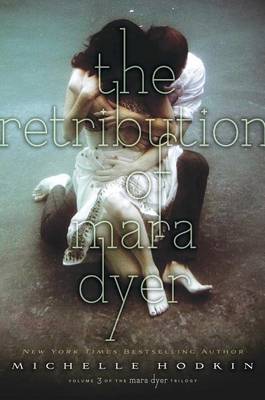
girlinthepages
Written on Nov 17, 2014
I don’t usually write spoiler-filled reviews, but I’ve had to make an exception for The Retribution of Mara Dyer. I feel like in order to discuss the book in the way I want too and in order to do it justice I really need to talk about all of the WTF moments and plot twists and revelations to dissect and really understand WHAT went on in this long-awaited conclusion to my favorite YA series. So if you have any thoughts on the ending, theories to the unanswered questions, or general ranting/raving, leave them in the comments!
“The freaks shall inherit the earth.“-pg 424
The Evolution of Mara Dyer ended on a wicked cliffhanger, and this book picks up right after. What I liked from the get-go is that now that Mara knows (or at least has a vague sketch) what happened to her (that she’s been manifested and watched by Dr. Kells and everything has been more or less staged since the asylum) she seems to have much more control over her situation. She’s done being afraid of her powers and of her psychological differences, and is ruthless when it comes to escaping and getting her life back and protecting those that she loves. The action begins with a rather gruesome scene and two murders (neither of which I was particularly sad about, considering how heinous Kells and her assistant were).
Right away information starts to gather, with Mara, Jamie, and Stella escaping and sharing their individual stories with each other about how their abilities came to be manifested, and what psychological abnormalities came along with them. Jamie’s ability of persuasiveness was particularly interesting and useful, as the trio has to make their way from Florida to New York while hiding their identities. Each of them has to learn to rely on their powers rather than fear them in order for them to survive, with Stella reading the minds of those around them and Mara “disposing” of individuals who seek to harm them. I like that this isn’t a morality tale, and that Mara doesn’t necessarily feel guilt over what she does (usually when it’s someone really dangerous trying to harm her/her friends). It really casts her as an anti-hero, which is unusual for a protagonist of a YA novel. Mara’s archetype that her genetic abnormality casts her as is the Shadow Self, or Frued’s death drive, which is a unique burden (and one that would usually be reserved for a villain) in literature.
What I did miss in this book were the psychological thriller aspects from the first two novels, where the reader is really unsure of how reliable of a narrator Mara is and all of these creepy mysterious things keep happening and you have to wonder whether Mara did them herself or if someone is out to get her or if someone wants her to think she did them herself. This book almost reads more sci-fi like, with the evil mad scientist/doctors controlling teenagers with super-hero like powers. So while this book had more sci-fi than psychological thriller creepiness, the unsettling imagery was still there. For instance, those things that were embedded in Mara’s stomach were so gross (and we never really were told what they were and how they worked to inhibit her powers). Watching Mara slice open her stomach to try and get them was pretty disturbing, but it was fascinating to see how her subconscious knew they were in there and that they had to be removed.
One of the aspects that I really loved about this series was the idea of genetic memory, and how Mara’s life experiences are intertwined with memories of her grandmother’s, who was also an active carrier of the gene. The mystery of the flashbacks in Evolution drove me mad, so it was satisfying to find out how her grandmother came to America and how her powers worked, who Abel Lukumi was (her grandfather, did not see that one coming) and how Noah and Mara’s fates were interconnected since before birth. I also loved that Daniel got brought into the fold, and how he accepted Mara’s story despite his logic-loving personality, and helped her, putting his allegiance as her brother who loved her above his possible fear of her powers. The message of acceptance was strong and I loved seeing that the book wasn’t dependent on an “us-vs-them” mentality that anyone who wasn’t a carrier couldn’t be close to Mara or the others.
One of my complaints about the book is toward the end the pacing felt a little off. When Mara, Jamie and Daniel get stuck on the subway train and then coerced into leaving it and following sinister messages down the tunnel, it didn’t feel like they were heading toward the final climax, but rather just another confrontation on their journey. It seemed sort of abrupt when there it’s revealed that Noah’s dad had been behind most of the plot, with his funding of Dr. Kells and Horizons in order to keep Noah “safe” due to his bitterness over losing his wife to her involvement with Lukumi and Mara’s grandmother and others who were carrier of G1821. It made sense with the way the plot was laid out, I suppose, but it was hard to picture him as being so cunning and involved when he had been mostly just a mention throughout the entire series up to this point. The big climax also felt a bit convoluted as there was a whole lot of dying/resurrection going on, which didn’t seem to make sense in some ways since Noah and Mara are supposed to be foils to each others’ powers…And Jude. Poor Jude. He was a first class psycho but knowing it was due to G1821 that had been forcibly artificially manifested on him when he was just a small child by Kells was really heartbreaking, and he’s another great example of a multifaceted character who’s both good and evil, which Hodkin seems skilled at writing.
The ending of the book is not one for those who need closure. Noah, Mara and Jamie are finally told my Abel Lukumi that they are indeed carriers of a gene that blesses and curses them with specific powers, and that they can choose to join others like themselves in using their powers for a purpose, or they can reject this calling and live their lives alone. I was seriously convinced that after reading the letter from his mother about how he could use his powers for so much good in the world and to evoke so much change that he would choose to leave Mara (since his powers are weakened by being with her) and Hodkin had me waiting with bated breath until the very end. The story finally comes full circle to the letter that appears in the prologue of the Unbecoming of Mara Dyer, with Mara beginning to write a (potentially somewhat fictionalized) memoir supposedly using the psuedonym of Mara Dyer- which is trippy when you think about it, because it poses so many questions. Did I just read the real account or did I just read her memoir with certain elements changed? There are also so many other unanswered questions: What happened to Stella after she left? Are Noah and Mara truly immortal as long as they don’t die at the hands of each other? What’s Mara’s real name? Why didn’t Lukumi help them more when they were trapped by Kells?
Overall:This book isn’t about fixing or saving anyone. At it’s core it’s about a group of people who through genetic abnormalities have been dealt a very different hand of cards than most other humans, and how they eventually have to learn to live with themselves and their powers- most of which live in that grey area between good and evil- and try to pursue a meaningful life as they are, abnormalities and all. “I’ve done terrible things I regret and terrible things I don’t. But I don’t need to be fixed. I don’t need to be saved. I just have to keep going.”
This review was originally posted at Girl in the Pages

